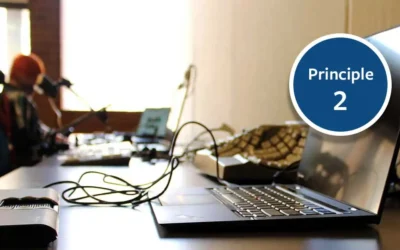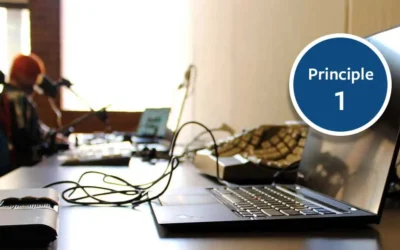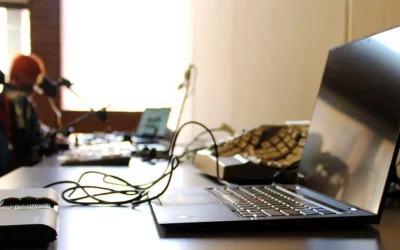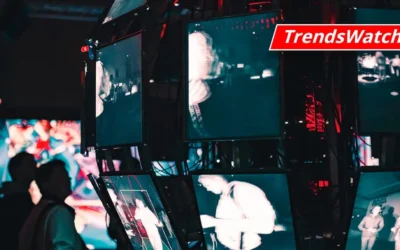Tips for the Museum Worker: Survival Edition

Rachael Cristine Woody
Welcome to a new year! Are you feeling excited? Trepidatious? Both? Me too. It’s easy to get stuck in a certain work mode when in a field that appreciates standardization and can be slow to change.
For many of us, we’re struggling a little harder with prolonged uncertainty and the frequency of quickly shifting policies regarding museum operations during a pandemic. Will we see the end of this crisis period in 2022? I sure hope so. Until then, I have three tips to share to help you as a museum worker—and your broader museum community—survive this next year.
1. Rest
Rest is often viewed as a luxury and not typically a prioritized activity in a capitalist economy. It’s also such a basic human need that it’s easy to perpetually overlook it or push it to the side. Did you know that when suffering trauma and grief our bodies require more sleep? Our bodies need the act of rest in order to support the nervous system in overdrive. Regardless of how you may consciously evaluate your own lived experience, these last few years have caused us all hardship.
“Get some rest. If you haven’t got your health, then you haven’t got anything.” – Princess Bride
Personal Tip: Give your body and your mind the rest it needs to process the experiences and begin to repair. Even if it’s just for a few minutes a day to start out. Even if you have to put it in your calendar to remind yourself. When we’re better rested, we’re better able to show up for the people and things we care about. We’re better partners, friends, and colleagues. Prioritize rest for yourself and encourage others around you to do the same.
Museum Tip: As we continue to reimagine museum content to better meet our audience’s needs, how can you incorporate rest? What collections, content, or programming do you have available to support opportunities for rest for the museum community? This could look like providing relaxing videos that tour the collections, or recorded meditation inspired by an item. For more inspiration, check out the Slow Art Movement and mark your calendar for Slow Art Day coming up on April 2, 2022.
2. Find Moments of Levity
We can’t be “on” all the time. While the distraction of “busy” can be a reprieve from larger issues, it’s not a sustainable strategy. A few years ago, when going through my own rough time, I found myself watching stand-up comedy. That may seem completely basic, but it’s the simple and surprising things in life that help us restart our brains. Also, comedy (good comedy) isn’t the ignorance of hardship. Hardship, trauma, and grief are some of the main ingredients for comedy. Comedy is a tool that can helps us feel the sincere sadness in a truth and moments later feel levity from processing it.
“[T]he secret source of humor itself is not joy, but sorrow.” – Mark Twain
Or, more often heard now as the equation: Comedy = Tragedy + Time*
Personal Tip: There is an amazing amount of comedy content out there on streaming and video platforms. If you’ve not delved into comedy before, I recommend trying a few comedians out. Once you find one you like there usually are at least a few more specials or curated content available.
Museum Tip: You don’t have the be the National Comedy Center to deliver levity with your collections. What are your levity assets? Cute and ugly animals, outrageously non-conforming art, items with an intriguing backstory, and behind the scenes shares are all elements that both showcase your collection while also providing levity to those in your community who need it. These are great opportunities to develop a deeper and more sincere connection with your museum audience.
3. Recalibrate to Survival-Mode
Life comes with different modes we can choose to live in, or that we sometimes find ourselves in via external influences. When experiencing a crisis (or crises) we tend to shift into survival-mode. In this mode both our body and our mind limit their focus on doing what they need to support basic operations. However, after a period of time our brains become accustomed to the crisis-level and because it’s been normalized (intentional or not) our brain will start pushing us to “return to normal”.
“It’s OK if all you did today was survive.” – Unattributed
Personal Tip: Things aren’t normal. They may never be pre-COVID normal, and we have yet to reach post-vaccine normal. My tip here is to give yourself a reality check. This is a reminder to consciously cut yourself some slack. Especially on the days where it feels like all you did was survive.
Museum Tip: Dear colleagues. You were already overworked and underpaid—a situation that has compounded with the pandemic. This museum tip isn’t for your community. It’s for you, the museum professional. You are only one person. Prioritize the activities that must be done to keep collections and people safe, and everything else can get in line. And it’s OK if all you did today was survive.
Conclusion
The thesis here is that you have to prioritize taking care of yourself because nobody else is going to do it for you. We are great stewards for our collections, we approach our work with care, and we anticipate and provide for our community’s needs. We have to apply that same care and stewardship to ourselves.
*To go further down the rabbit hole on this topic, I recommend reading “The Comic in the Midst of Tragedy’s Grief with Tig Notaro, Hannah Gadsby, and Others,” authored by Cynthia Willett and Julie Willet, and published by The Journal of Aesthetics and Art Criticism, Fall 2020.

Rachael Cristine Woody
Expert Rachael Cristine Woody advises on museum strategies, collections management, and grant writing for a wide variety of clients. In addition to several titles published by Lucidea Press, Ms. Woody is a regular contributor to the Think Clearly blog and a popular presenter. She also partnered with Lucidea to develop a free grants directory and database; use it along with a free grants workbook to familiarize yourself with grant strategy and use the four grant project templates provided.
Similar Posts
Museum Collections Online with Accessibility Principle 2: Operable
Compliance with WCAG Version 2.1 Principle 2: Operable
Museum Collections Online with Accessibility Principle 1: Perceivable
Compliance with WCAG Version 2.1 Principle 1: Perceivable, affecting information published from museum CMS to an online portal; expert guidance
Accessibility Standards for Museum Collections Online
A museum’s compliance with the ADA Title II 2024 update has benefits for its online content and for the museum’s community of users.
Museum TrendsWatch 2024: Digital Twins and Doom Loops & Combatting the Loneliness Crisis
Digital Twins is the construction of a digital surrogate for a person, place, or thing—one of several new concepts and trends in the museum sector.




Leave a Comment
Comments are reviewed and must adhere to our comments policy.
0 Comments